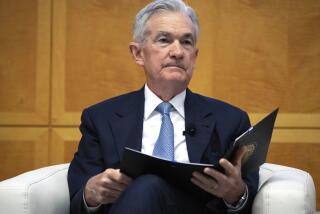Central banks in Europe, Britain hold rates steady
The European Central Bank left its benchmark short-term interest rate unchanged at 4% on Thursday as policymakers weighed signs of slowing economic growth against the threat of accelerating inflation.
Separately, the Bank of England left its key rate at 5.75%.
The policy stances of the two central banks are in marked contrast to that of the U.S. Federal Reserve, which has cut its benchmark rate three-quarters of a point since mid-September, to 4.5%, in an attempt to calm financial markets hit by mortgage-related losses.
Short-term interest rates overseas, held steady while U.S. rates have fallen, have helped drive down the dollar’s value as some global investors have shunned dollar-denominated debt and other securities.
The euro on Thursday held at $1.467, matching the record high set on Wednesday.
But signs of discord have grown among the European Central Bank’s 19 governing council members. With record oil prices stoking the fastest inflation in two years, some members have signaled they want to raise interest rates further.
Other policymakers say the euro’s appreciation and the U.S. housing slump will curb Europe’s economic expansion and dampen price pressures. The strong euro makes it tougher for European companies to sell abroad by boosting prices of their goods.
“Our monetary policy stands ready to counter upside risks” of inflation, ECB President Jean-Claude Trichet said at a news conference Thursday.
Still, he added that financial market volatility had increased uncertainty about the economic outlook, warranting “a thorough examination of additional information before drawing further conclusions” for rates.
The ECB had planned to raise rates in September to counter inflation, but shelved that move after losses on U.S. mortgage-backed bonds infected some of Europe’s big banks.
Europe’s economy is showing signs of cooling, which has led some analysts to predict that the central bank will keep rate adjustments on hold indefinitely.
Manufacturing in the euro-zone economy grew at the slowest pace in more than two years in October, and business and consumer confidence in the economic outlook declined for a fifth straight month.
Britain’s economy also is showing signs of slowing, and many analysts expect the Bank of England to trim rates.
“They’re in wait-and-see mode,” said Neil Mackinnon, an economist at hedge fund ECU Group in London. “We are in for an economic slowdown that will become more apparent as we go into the early part of next year and that’s when they are likely to cut.”
More to Read
Inside the business of entertainment
The Wide Shot brings you news, analysis and insights on everything from streaming wars to production — and what it all means for the future.
You may occasionally receive promotional content from the Los Angeles Times.










